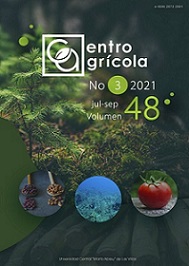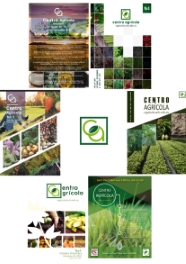CE: 1830 CF: cag092192225
RESEARCH ARTICLE
Use of carcinogenic agrochemicals in the agricultural region of Yucatan, Mexico
Uso de agroquímicos cancerígenos en la región agrícola de Yucatán, México
Angel Gabriel Polanco Rodríguez1*, Teresa Virginia Magaña Castro2, Jorge Cetz Iuit3, Rocío Quintal López4
1 Laboratorio de Medicina Social y Salud Pública, Centro de Investigaciones Regionales, Unidad de Ciencias Biomédicas de la Universidad Autónoma de Yucatán, Mérida, Yucatán, México, CP 97000
2 Universidad Marista de Mérida. Administración de Recursos Naturales. Periférico Norte, Tablaje Catastral 13941. Carretera Mérida - Progreso, Mérida, Yucatán, México, CP 97300
3 Agroecología, Universidad Autónoma de Yucatán, Campus de Ciencias Biológicas y Agropecuarias. Carretera Mérida-Xmatkuil Km. 15.5
4 Grupo de Investigación de Género, Cultura y Sociedad, Centro de Investigaciones Regionales, Unidad de Ciencias Sociales de la Universidad Autónoma de Yucatán, Centro Histórico, Mérida, Yucatán, México, CP 97000
*Autor para correspondencia: This email address is being protected from spambots. You need JavaScript enabled to view it.
ABSTRACT
The indiscriminate use of highly toxic agrochemicals and especially the herbicide glyphosate, are of global concern nowadays, since they produce high pollution impacts for the aquifer and public health. The karstic soils of Yucatan, Mexico, are extremely vulnerable to contamination of the aquifer, due to the easy filtration of pollutants. There is evidence of contamination of the Yucatan aquifer, Mexico, by organochlorine pesticides, as well as its bioaccumulation in blood of women with cancer and breast milk, due to agricultural activities. In order to characterize the knowledge on the handling of agrochemicals, interviews were conducted, aimed at farmers and housewives in the municipalities of Tekáx, Oxkutzkab and Dzán, in the agricultural area at Yucatan. To the information process were used the STAT, SPSS, ArcMap, and Ethnograph programs were used. The results indicate the use of 69 classes of agrochemicals, among them, organochlorinated pesticides such as lindane and endosulfan 23 %, DDT 13 %, heptachlor 10 %, aldrin 10 %. Likewise, 55 % of the farmers reported using the glyphosate herbicide for the production of soybeans. In the backyard production, women use agrochemicals for the production of vegetables and pest control of small animal species. The results show the use of pesticides banned and / or restricted by international organizations, as well as glyphosate for the production of soybean, representing high impacts for human health and the aquifer. It is recommended to apply the international norms, as well as educational programs with agroecological basis on sustainable agriculture, avoiding applying carcinogenic agrochemicals.






